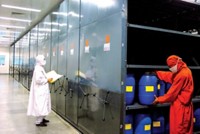Advertisement
Grab your lab coat. Let's get started
Welcome!
Welcome!
Create an account below to get 6 C&EN articles per month, receive newsletters and more - all free.
It seems this is your first time logging in online. Please enter the following information to continue.
As an ACS member you automatically get access to this site. All we need is few more details to create your reading experience.
Not you? Sign in with a different account.
Not you? Sign in with a different account.
ERROR 1
ERROR 1
ERROR 2
ERROR 2
ERROR 2
ERROR 2
ERROR 2
Password and Confirm password must match.
If you have an ACS member number, please enter it here so we can link this account to your membership. (optional)
ERROR 2
ACS values your privacy. By submitting your information, you are gaining access to C&EN and subscribing to our weekly newsletter. We use the information you provide to make your reading experience better, and we will never sell your data to third party members.
Environment
Indian Leader Takes The U.S. By Storm
Pharmaceuticals: Prime Minister Modi’s visit raises both hopes and fears of change in India
by Jean-François Tremblay
October 1, 2014

During a five-day trip to the U.S., India’s Prime Minister Narendra Modi delivered a speech at the United Nations, met with President Barack Obama at the White House, and addressed the Indian community at New York City’s Madison Square Garden. His whirlwind tour raised hopes—or fears depending on the perspective—that to speed up economic growth India will adopt new measures favorable to U.S. companies.
The trip generated controversy. A brouhaha arose over the quality of Indian pharmaceuticals sold in Africa, and activists and industry traded barbs regarding India’s attitude toward intellectual property. But most India watchers judged the trip, which ended on Sept. 30, to be a success.
The huge attention Modi attracted and the warm reception he got at the White House were the highlights of the journey, according to Yusuf K. Hamied, chairman of Cipla, a leading Indian producer of generic pharmaceuticals. “The prime minister put on a fantastic show,” he said. The U.S. has had a tendency to bully India, but Hamied now expects it will ease.
Notably, Hamied anticipates the U.S. will tone down its rhetoric around patent protection for pharmaceuticals. Just prior to Modi’s trip, the charity Doctors Without Borders, known by its French acronym MSF, urged the prime minister to resist pressure to adopt patent laws similar to those in the U.S. Cheap Indian drugs are a “vital lifeline for MSF’s medical humanitarian operations and millions of people in developing countries,” the group said. The U.S. International Trade Commission has placed India on a watch list and has been looking closely at the country’s intellectual property regime, MSF noted.
But the quality of the pharmaceuticals that India exports to developing countries is questionable, according to a study just published by the National Bureau of Economic Research, a nonprofit research organization. “Drug quality is inferior among drugs purchased inside African countries compared to those purchased inside India or middle-income countries,” the study authors claim.
The India Brand Equity Foundation, a group supported by the Indian government, promptly blasted the study as being part a “smear campaign” against the Indian pharmaceutical industry timed to coincide with Modi’s visit. The report was written by four scholars, two of whom work at the American Enterprise Institute, a conservative think tank.
Meanwhile, the U.S. industry group Alliance for Fair Trade with India urged Obama to encourage Modi “to level the playing field for U.S. companies in India.” India’s regulations are at odds with international standards, the group claimed. Patents pose a particular problem, it added, because they are not always granted, are occasionally revoked, and are sometimes ignored when expedient. “A landslide election has given Mr. Modi a mandate for transformational economic reforms,” the alliance noted.
The actual meeting between Obama and Modi yielded little concrete for the pharmaceutical and chemical industries. In their joint communiqué, the U.S. and India announced plans for a “high level” working group that will meet annually to address intellectual property protection. And U.S. chemical companies active in water treatment may find a more favorable environment in India because the two countries “committed to a new partnership to advance the prime minister’s goal of improved access to clean water and sanitation for all.”
A change in tone in the relationship between the U.S. and India may be the most palpable outcome of Modi’s trip, Cipla’s Hamied observed. “America sees India as a partner now,” he said.



Join the conversation
Contact the reporter
Submit a Letter to the Editor for publication
Engage with us on Twitter